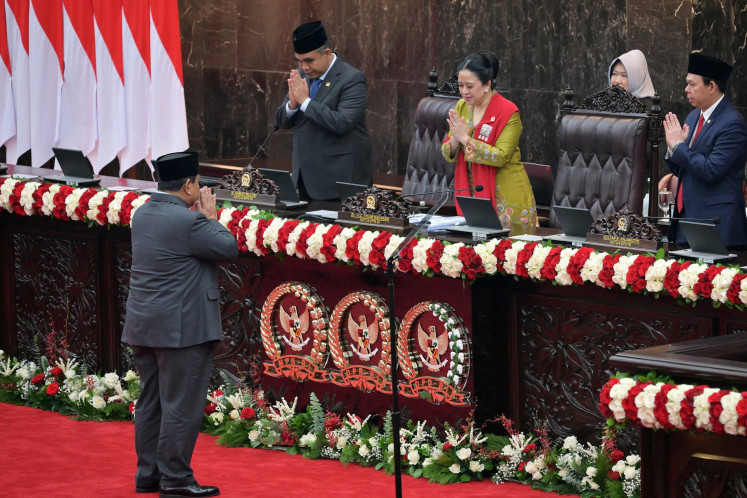Popular Reads
Top Results
Can't find what you're looking for?
View all search resultsPopular Reads
Top Results
Can't find what you're looking for?
View all search resultsWill global changemakers ever come from Indonesia?
To answer the question Indonesia first needs to deal with its internal problems.
Change text size
Gift Premium Articles
to Anyone
“An iPod, a phone and an internet communicator… Are you getting it? These are not three separate devices. This is one device. And we are calling it iPhone," said Steve Jobs confidently in his keynote iPhone presentation ten years ago. The journalists and analysts at the Macworld Expo instantly responded with cheers and claps.
The speech at the Macworld Expo was welcomed with skepticism by many tech company CEOs at that time. Despite the doubts, in just a few years two things were irrefutable: First, they had to bitterly agree that Steve had been right when saying in his presentation that the entrenched incumbents’ flagship devices were ‘ugly’ and ‘not so smart’. Second, in order to survive in the mobile phone market, there was no other way for them but to make radical changes to their products by getting rid of the physical keyboard and throwing away the stylus, replacing them with a new wide-screened device just like the iPhone.
Steve Jobs has changed the world as other innovators have, such as Bill Gates, Jeff Bezos, Sergey Brin, Larry Page and Mark Zuckerberg, to name a few. None of them is Indonesian. With its improved economy, more democratic politics, rich natural resources, population of 250 million, and demographic dividend (more people at productive ages), will Indonesia be able to produce world changemakers?
To answer the question, Indonesia first needs to deal with its internal problems.
Reading not yet a hobby
In educational institutions, many students are still afraid of expressing their feelings, thoughts, emotions and creativity because of the fear of being wrong. As a result, if one asks kindergarten pupils to make a drawing, the majority of them will possibly draw the same picture: a landscape of two mountains with a rising sun.
Reading is the next issue. Research conducted by Central Connecticut State University in the US a year ago revealed that Indonesia ranked 60 out of 61 countries in terms of reading passion. Reading is imperative for world changemakers because it is not only inspiring, but also, as studies show, able to slow the rate of memory decline, sharpen the mind and improve critical and analytical thinking skills.
Reading is not yet a hobby let alone a culture in Indonesia. Moreover, parents are generally not educated enough to encourage children to love books, so a culture of reading is almost impossible to establish in the family. These facts give an answer to why library visits in many parts of Indonesia are rock bottom, and why the majority of Indonesians do not have personal libraries in their homes.
The impact of this lack of a reading culture is disastrous to the extent that Indonesian students performed badly in the OECD Program for International Student Assessment or PISA 2015, achieving a ranking of 64 out of 70 countries, one of the lowest among PISA-participating nations.
Untapped diaspora
In addition, Indonesia has not yet taken full advantage of its diaspora of eight million people, especially those who have gained international recognition. It is time to lure the best Indonesians living overseas home and utilize their qualities to advance the country just as the Chinese government has been doing with its Thousand Talents Program, a scheme which has so far attracted tens of thousands of Chinese experts and over one million students back to China. The effect of the return migration program has been so powerful that China is now enjoying significant improvements in science, education, health and culture.
Furthermore, even though Indonesia sends more than 40,000 students each year to study in world class universities abroad through a broad range of government-funded scholarship programs such as LPDP, BUDI, and MORA for example, scholarship providers, especially LPDP, have not yet made binding arrangements with its awardees for work placements. As a result, after graduation, awardees who do not have permanent jobs face an uncertain future and often end up in working in the private sector. Since the government has invested massive amounts of money in educating these individuals, giving them positions in state-owned companies, universities or other government offices is of course far better and propitious than letting someone else enjoy the fruit.
Calling our diaspora home and harnessing the potential of scholarship recipients is critical for developing Indonesia, because these people have extensive international networks with overseas business players, research centers and universities, as well as valuable experience in a global world. If they are given an opportunity to apply their expertise at home, then the dream to have world changemakers will no longer be an unworkable one for the world’s fourth most populous nation.
Finally, Indonesia’s endeavors to produce world changemakers will always be hindered if the archipelagic country does not fix its uneven education quality. Schools in the city and those in the countryside are like heaven and earth. The former are equipped with state-of-the-art education facilities complete with highly qualified tutors, while the latter oftentimes are just fragile old buildings whose teachers are busy doing other jobs as the pay from the school is not sufficient to cover daily expenses. These conditions surely need immediate solutions from the government, as half of the Indonesian population is villagers. This means there is the same number of students in villages as in the city. If this inequality problem persists, a massive loss awaits because among school students residing in villages, there could be some who have the potential to become world changemakers. As they are not receiving a proper education, their exceptional talents die in vain.
Steve Jobs and other innovators have changed the world as well as the way we live our everyday lives. Will the next world changemaker come from Indonesia? If all the problems are addressed, why not? (dev/kes)
***
Muhammad Beni Saputra is a lecturer at the State Islamic University Sulthan Thaha Saifududin Jambi. He received an MA degree in American Studies from the University of Manchester, UK. He is an Indonesian writer whose pieces have been published by The Huffington Post, The Diplomat and New Mandala, among other publications.
---------------
Interested in writing for thejakartapost.com? We are looking for informative stories and opinion pieces from experts in a variety of fields, and others with appropriate writing skills. All content must be original on any of the following topics: lifestyle ( beauty, fashion, food), entertainment, science & technology, health, parenting, social media, sports. Submit your writing to community@jakpost.com. Click here for more information.










